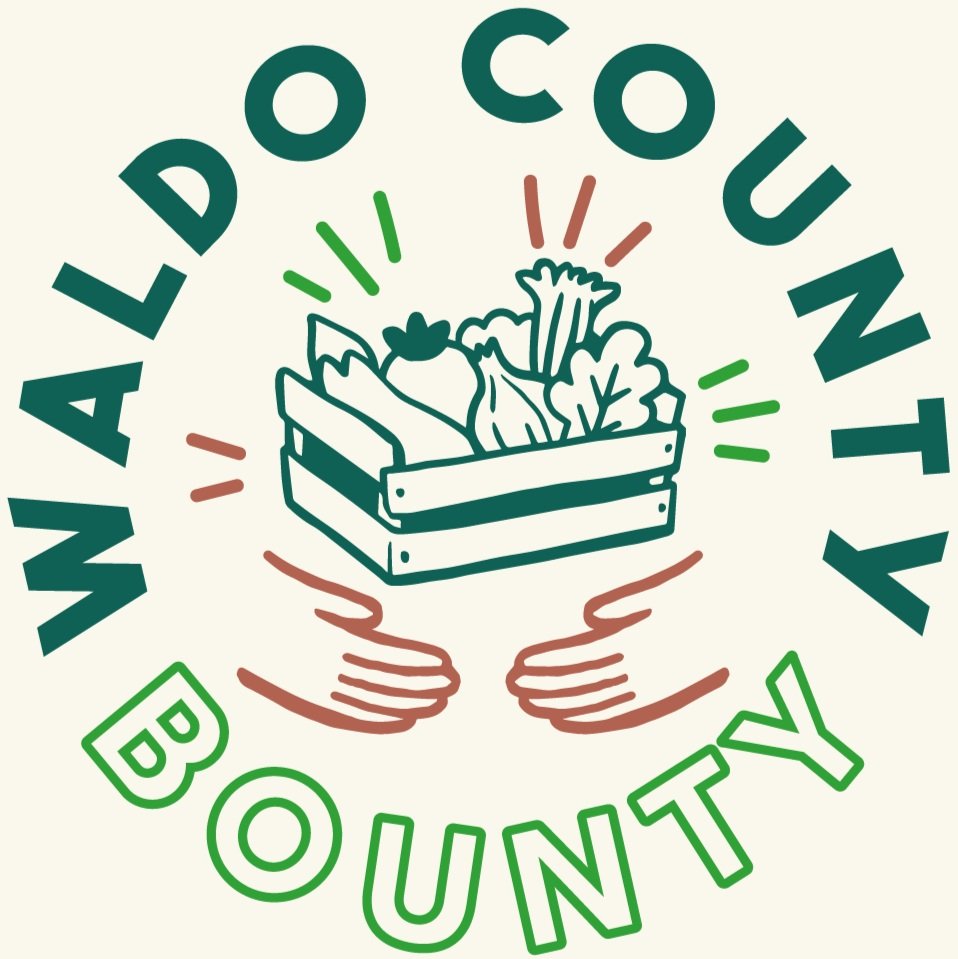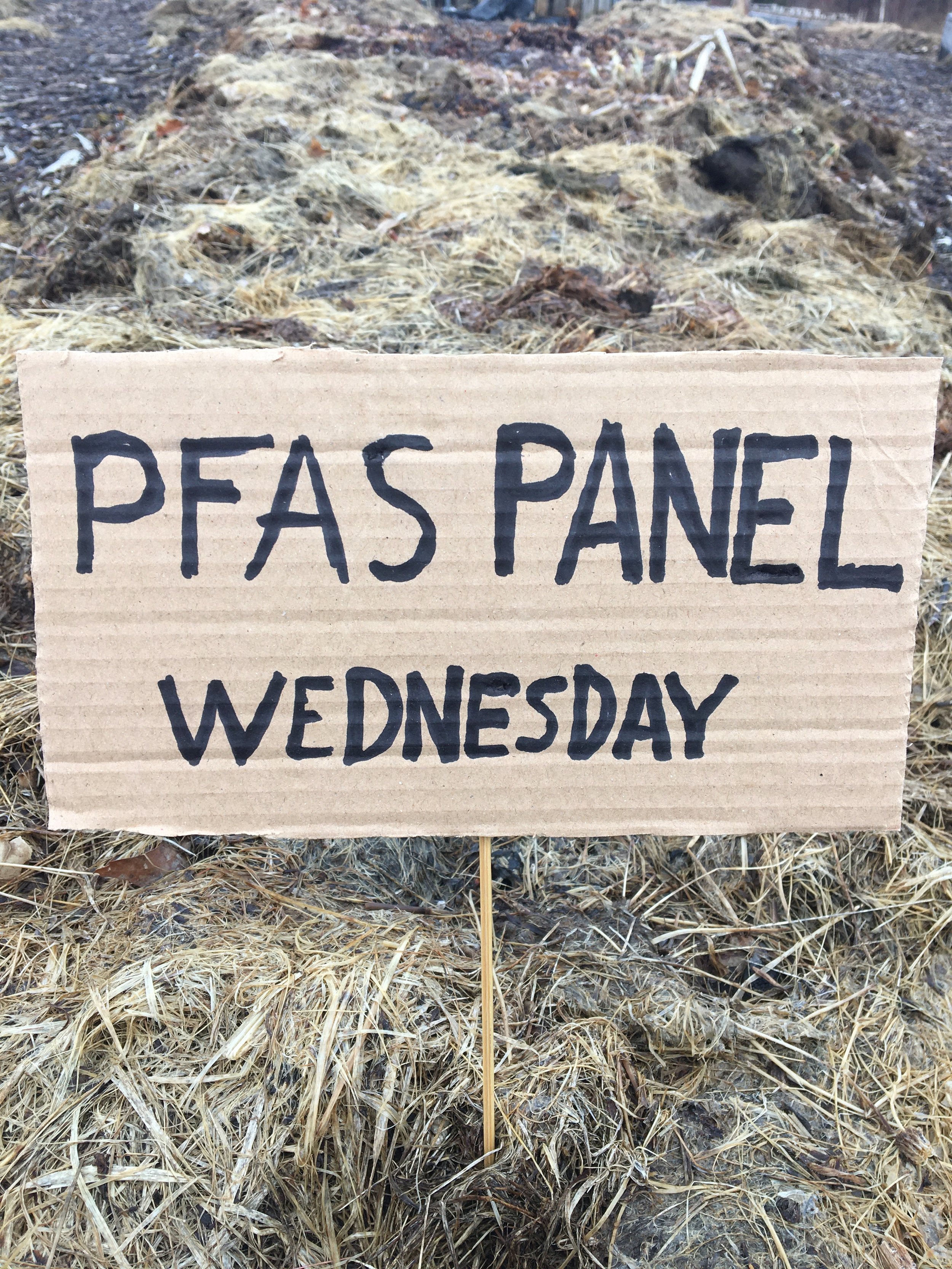Published March 31, 2022
Spring WCB Network Meeting with PFAS Panel Minutes 3.23.22
4:00pm WCB Consultant Sara Trunzo welcomes attendees.
4:05pm WCB Program Updates: Treasurer Lissa Widoff
· Despite PFAS challenges, WCB does not see any immediate reduction in programming in 2022. Total Farm-to-Pantry and Gleaning yields should be similar to 2021.
· WCB has conducted research on food insecurity and the hunger relief and farming sectors in Waldo County, including a Landscape Scan and Assets Catalog, which it will share with the community when finalized.
· WCB has begun educational initiatives related to policy and advocacy related to the local food system.
4:08pm Johanna Davis, co-owner/operator of Songbird Farm in Unity, ME.
· Thank you for coming to learn more about PFAS, as it is ruining my life right now. We found out that sludge was spread on our land two owners before us. We found out PFAS is in our well, soil, and crops a few months ago. We pulled our products and are now working with government agencies and other organizations. Our testing shows that we are at 250 parts per billion.
· We are learning what crops take up PFAS and which do not. Greens really do take them up, and other plants with a lot of green photosynthesizing parts of a plant.
· Right now, we no longer have a farm. We do not even have enough information to suggest we should continue to cultivate the soil. We are currently moving off the farm for the summer.
· The Emergency funds set up by MOFGA and MFT have provided us with supplementary income for the past month and it has been lifesaving. Those in the community are also giving us meaningful support.
4:16pm Rick Kersbergen, Extension Professor of Sustainable Dairy and Forage Systems at UMaine Cooperative Extension. Email: richard.kersbergen@maine.edu.
· I have been around long enough to remember when Johanna’s land was treated with biosolids. At the time, it was thought safe, and people were mostly concerned with heavy metal content.
· Now we’re following what happens with PFAS. We have had two dairy farms close as a result of this. We are seeing forage crops really taking up the chemicals, whereas grains appear to take them up less readily.
· Bioremediation products are being developed to help deal with this and help folks stay in business.
· Crops take up more chemicals when watered with PFAS impacted water. In vegetable products, a whole host of PFAS chemicals appear (whereas only a few chemicals transfer in other contexts).
4:21pm Tricia Rouleau, Farm Network Director and PFAS Response Coordinator at Maine Farmland Trust. Email: trouleau@mainefarmlandtrust.org. Phone: 207-899-5515.
· We have been working with farmers to communicate what it means when you have a farm easement with PFAS contamination.
· Since February, we’ve been working with MOFGA to help farmers achieve their needs related to PFAS. We are offering weekly payments to farms who are referred to us by the Department of Ag. Ultimately, the Department of Ag will reimburse funds.
· Relatedly, we’ve been hearing that some banks are requiring testing, and we’re working to assist farmers respond to such cases.
· The Farmer Wellness Program offers $500 vouchers to farmers/farm workers impacted.
· We’re working to both address immediate needs and anticipate needs.
4:27pm Sarah Woodbury, Director of Advocacy at Defend Our Health. Email: swoodbury@defendourhealth.org.
· We have been working on PFAS since the Stoneridge Farm PFAS crisis in 2017.
· PFAS is a set of 7,000-9,000 chemicals – from carpet cleaners to waterproof mascara. They end up in our water and landfills because just washing a nonstick pan puts it in the water. It’s a really prevalent problem.
· Maine is really leading a lot of this. Bills:
· The first one that we passed created a standard for PFAS in drinking water.
· We also passed a bill (LD1600) that created the PFAS a map.
· The most recent bill that we passed will make it illegal to sell non-essential products containing PFAS in Maine by 2030.
· This session there are three bills making their way:
o LD1911: Currently, if sludge tests at above standard PFAS levels, it cannot be spread on land. That said, people are already saying the PFAS levels are too high. Those that test too high undergo more composting and are then spread. This bill says NO PFAS spreading. Will be on house floor next week.
o LD1875: To protect rivers and streams, especially around Penobscot Nation. Will be on house floor tomorrow.
o LD2013: A massive funding bill – $100 million – for impacted farmers and those with PFAS in wells.
4:35pm Sara Begins Q&A
Question 1: Could hemp pull PFAS out of soil?
Rick: We are testing that this summer. We are also testing a foraging grass. The problem is, once we pull the contaminated product out of the soil, how do we dispose of it?
Sarah: Right now, landfilling is unfortunately one of the best options.
Question 2: Have people been hearing from people in other states with PFAS concerns?
Rick: A Texas situation focused on fire fighting components. I think Maine will lower the acceptable level of PFAS in water, which will drop acceptable levels in milk, then beef, etc. The standards could drop to 2 parts per trillion in the near future.
Sarah: Every state is facing this, so Maine is not an outlier. We are the one’s taking care of it now, and I think we will lead the pack.
Question 3: Is anyone addressing florid in drinking water?
No answers.
Question 4: “We've been told our farm is tier 3 for testing because sludge was spread on a neighboring farm that was class a and class b over 69 acres.”
Rick: Testing is based on volume and numbers of year that biosolids were spread. If you’re concerned with testing, reach out and see if they will help with testing. There’s an application on the DEP website. Or reach out to MFT or MOFGA.
Tricia: Based on your information, I think it’d be worth your time to put in your information in our MFT or MOFGA websites. We’ve been working with Northern Tilth to help with testing.
Sarah: Tests cost about $280. If you do not test at a certain level, the state will not compensate you for the testing fee.
Question 5: Our land was impacted by manure. Would the fact that the PFAS were digested help reduce PFAS contamination?
Rick: Main excretion in cows is milk, so if a cow is lactating, it usually removes many PFAS that way, which would improve the manure safety.
Question 6: What distance should people be concerned with from a sludge site?
Rick: Not clear. We have one instance in which a person had contaminated land and one of their neighbors is contaminated, the other is not.
Sarah: It really varies.
Question 7: If you’re adjacent to a farm, what resources are available to you?
Tricia: Neighboring residential landowners can be eligible for testing and, potentially, water treatment resources.
Sarah: Defend Our Health can help here too.
Rick: Just for perspective: If you look at PFAS levels across the country, they are much lower today than 10 years ago.
Question 8: Dupont and others knew that these chemicals were dangerous and kept making them. We want an apology in the form of billions of dollars.
Sarah: The responsibility lies primarily with those companies, not the state of Maine. The way chemicals are grandfathered into use is a mess.
Rep. Paige Zeigler: I agree we need a lawsuit. They are still making these chemicals and the new ones are even worse. We’ve got one hell of a problem here. We need to work collectively. The state needs to work with NGOs.
4:58pm How to take action:
Tricia: Concern is growing.
Rick: The PFAS map is just a guide. Some neighbors are finger-pointing at farmers, and it really wasn’t their fault. It goes back to the manufacturers.
Sarah: Agreed. The farmers were told it was safe from the state. LD2013: reach out to your legislators. The one I’m really worried about is LD1911, because it will ban PFAS and major corporations are pushing back. It makes no sense to continue a practice that has been proven harmful.
Johanna: There is not proof the broccoli you buy from the grocery store has less PFAS than from our farm.
5:05 Sara thanks all in attendance. CLOSE

